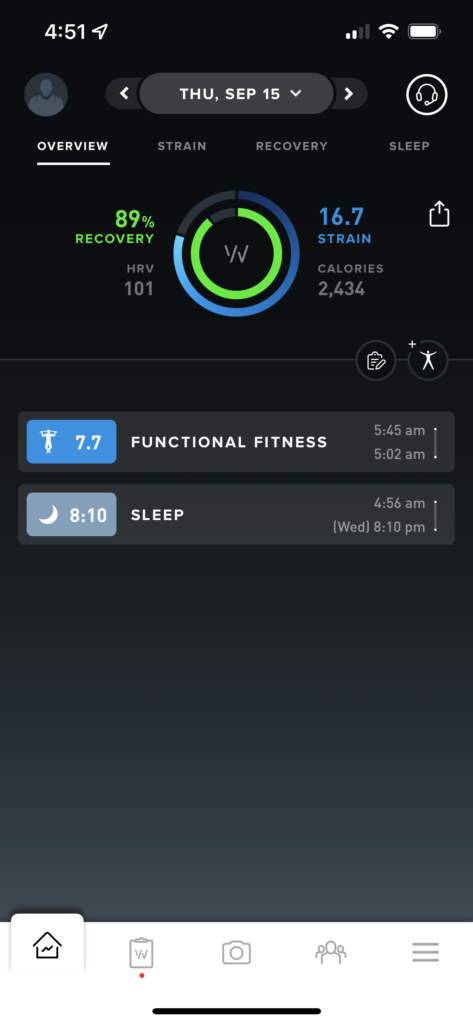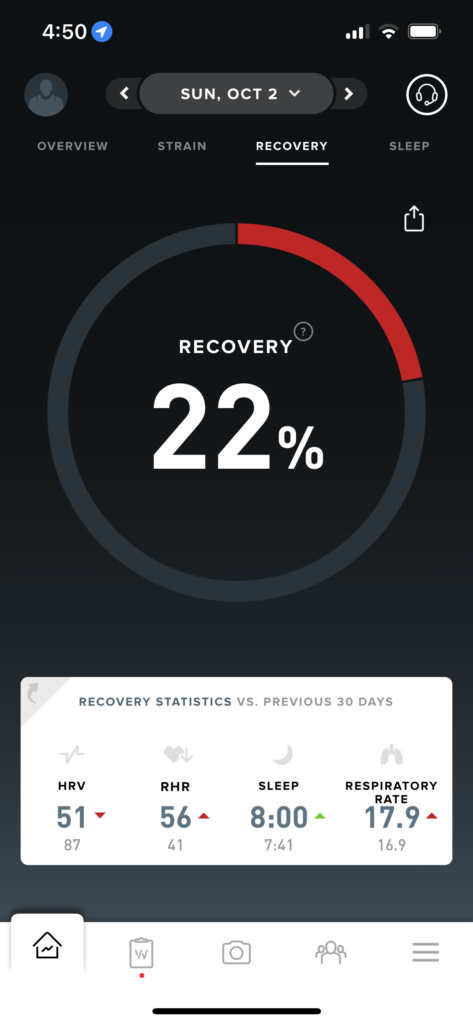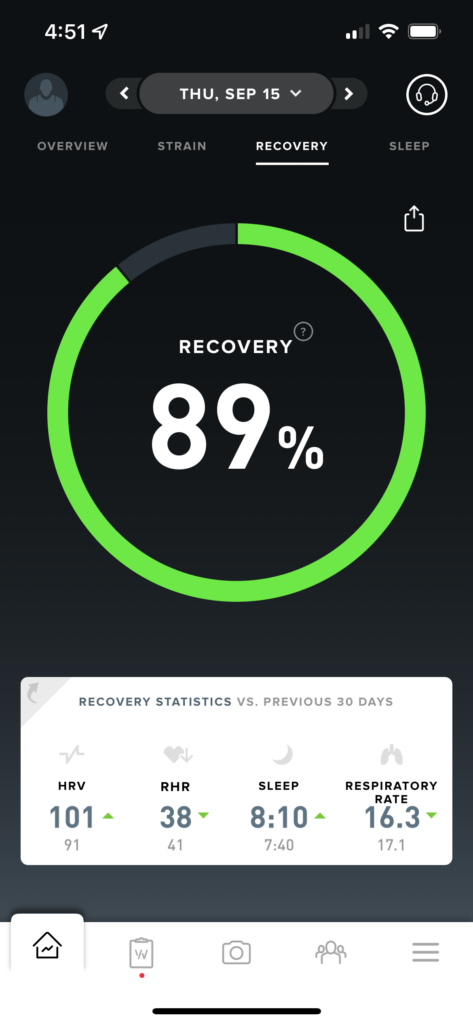Puffy face, bad food cravings, always tired, sore muscles, achy joints, “mom brain”, depression, stress, anxiety, weight gain, and trouble losing weight. These are all things you can experience if you are not getting the proper recovery within your sleep. Let’s find out how recovery, sleep, and nutrition are all linked together.
What is the difference between sleep and recovery?
Sleep is what every single human has to do in order for their body to recharge. It allows us to take in and store everything that happened that day, recover, and then set you up to do it all over again the next day. It is incredibly important for our brains. This is when our REM sleep takes all we learned during the day, stores it and makes connections to improve our mental model. NREM is our deep sleep that lets our brain relax from all the work it does for us during the day.
This is when recovery comes into play. If you don’t get a full 8 hours of sleep you lose chunks of REM and NREM and therefore you do not fully recover. There can be many reasons why you aren’t getting the recovery you need within the time frame you are in bed, but today I am going to focus on nutrition and how that can affect how you sleep.
The 3 major sleep killers:
- Alcohol
- Sugar
- Big meals
“You don’t know, until you know.” Why does recovery, sleep, and nutrition go hand in hand?
Before I get into this, and give you a deep look into my body, I can’t even tell you the number of clients I have had that say they sleep fine, and when I finally convince them to get a sleep tracker, they are recovering FAR below where they should be. Data is the ONLY WAY that you will know what is actually happening while you sleep and it is 100% worth the money.

Here is a diagram of my sleep from my whoop tracker, on a regular night. This is where I ate healthy, performed my bedtime routine, got into bed at a good time, and ultimately got great sleep.
Here are things to notice:
- I was in bed for 8 hours and 44 minutes but only got 8 hours and 10 minutes of sleep.
- I was awake for 34 minutes and the yellow is telling me that is unusually high.
- My REM and DEEP sleep accounted for 40% of my sleep.
- My recovery is at 89%.
- All my heart rate stats are in the green and my respiratory rate is great.
Next, let’s take a look at a not so good night of sleep where my whoop tracker was NOT happy with me. On this particular evening I drank alcohol, ate a huge amount of gluten and sugar, and also got into bed later than I normally do. Things to notice:
- The RED 22% recovered.
- Notice I still got 8 hours of sleep but I have NOT recovered.
- While I still got adequate amounts of REM and DEEP sleep I felt exhausted.
- Wake events were 2% higher.
- Respiratory rate skyrocketed.
- Heart Rate variability is insanely low from 87 to 51.
- Resting heart rate up 15bpm!!

Ok, so why is this happening?
Alcohol and the effects on our sleep:
- We mistake sedation for sleep. Sedation is NOT sleep.
- When your body is processing alcohol, you sleep in fragments and wake up more throughout the night.
- Your REM sleep does not occur because of these constant awakenings.
- If REM sleep does not happen, your memory, mental and emotional health suffer.
- Alcohol is not a sleep aid.
Sugar has a similar effect.
- Large sugar consumption before bed results in sleep disruption, and restless sleep.
- Sugar inhibits you from getting into the deep wave restorative sleep.
- Sugar activates the reward circuitry in our brains and releases dopamine, the hormone of pleasure. The brain gets used to that dopamine rush and to feed that pleasure you need to eat more and more.
- Unfortunately sugar and less quality sleep set you up to repeat the pattern the next day, and the next. Both are related to our metabolism and hunger cues. If you don’t get proper recovery it will interfere with our appetite control hormones Leptin and Ghrelin.
- Eating sugar leads to poor sleep which leads to bad cravings. Repeat.
Why big meals before bed are a bad idea for optimal recovery.

- Our bodies work hard to digest food. If our digestive system is overloaded with a huge meal we will not get reparative sleep.
- Many times when we overeat, indulge in sugar, alcohol, and excess gluten, we get really sleepy, and have to lay down. That is your body telling you that you overate.
- Food is supposed to give us energy, not slow us down.
- Eat at least one hour before bedtime.
- Try to make your dinner the smallest meal of the day; 300-500 calories.
- Eat slow. Take breaks. Chew your food. (I am the speediest eater on the planet. I have to consciously tell myself to slow down.)
- Plan your meals ahead of time. Choose unprocessed whole foods; a protein, vegetable, and a fat (olive oil, ghee, coconut oil).
- Skip dessert or snacking after dinner.
As you can see from my scores above, data doesn’t lie. This is why tracking your sleep is SO important. And also really cool to see how your insides work and understand why you feel more tired some days. I am very consistent with my recovery and bedtime routine. I know what works for my body and what doesn’t. Of course I still indulge and I am flexible because that is life! Knowing this information and data to help my body keeps me on track and aware to plan ahead of time a nap when I know my recovery will be below average.
Guys, imagine if you are doing these three things every single night, or even once a week on a consistent basis. Not only will sleep debt add up and can cause all kinds of trouble for our bodies, It is super hard on our whole system. Sleep deprivation can cause heart disease, cancer, dementia, Alzheimer’s, and Parkinson’s. It weakens your immune system tremendously. You have a 60% better chance of catching a cold than someone who gets a proper night of sleep.
Sleep is the number one foundational habit practiced at Flourish Every day. Stop messing around and get some data. You can get your first month of whoop free. Hop on our sleep program. We provide sleep solutions for the whole family!!
There is always room for growth in your sleep practice. Our bodies change and so does our sleep. I have had a consistent sleep practice for about two years, and I have come so far. I can’t even voice to you how this has changed my life. Right now I am working on the random overindulgence encounters spoken of above. Know wherever you are at right now, it doesn’t matter. Start now!! Be patient and consistent, and you will not be disappointed.
“When sleep is deficient there is sickness and disease. And when sleep is abundant, there is vitality and health.”
Dr. Matthew Walker
GET THESE RESOURCES:
Why we sleep Matthew Walker
Sleep Smarter Shawn Stevenson
How caffeine and alcohol affect quality of sleep
The moment that changed Arianna Huffington’s life
Whoop Band sleep tracker First month free!!! One month of data!!
Oura Ring– Don’t like bands, look no further!
[…] the motions, just like brushing your teeth. Want to learn more about quality sleep? Check out this blog! If you have no idea where to start, schedule a free 30-minute call […]